初中反义疑问句讲解及练习
反义疑问句详细讲解及习题及答案

反义疑问句一.句型解释反义疑问句(The Disjunctive Question):即附加疑问句。
它表示提问人的看法,没有把握,需要对方证实。
反义疑问句由两部分组成:前一部分是一个陈述句,后一部分是一个简短的疑问句,两部分的人称时态应保持一致。
1.陈述部分肯定式+疑问部分否定式2.陈述部分否定式+疑问部分肯定式She was ill yesterday, wasn’t she?You didn’t go, did you?二.特殊的句型1.祈使句。
祈使句后一般加上will you或won't you构成反意疑问句,用will you 多表示“请求”,用won't you 多表示提醒对方注意。
例如:Let引导的祈使句有两种情况:1) Let's...,后的反意疑问句用shall we或shan't we。
例如:Let's go home, shall we/ shan't we? 回家吧,好吗?2)Let us/me...后的反意疑问句用will you或won't you。
例如:Let me have a try, will you/won't you?3)祈使句都用will you 或won’t you2.当陈述部分含I think (believe, suppose...)that... 结构时,其反意疑问句须与从句的主、谓语保持一致,注意主句的主语必须是第一人称。
例如:I don't think he will come, will he?若是非第一人称,则与主句的主语相一致He thinks that she will come, doesn’t he?反意疑问句的陈述部分为I(We) don’t think(believe, suppose, consider)+ that从句时,从句为否定意义,问句部分的动词和主语仍与that从句保持一致且用肯定式。
反义疑问句讲解与练习

反义疑问句讲解与练习一、含be(is, are, was, were)动词的反意疑问句(1)句型1:主语+ be+其它,isn’t(aren’t, wasn’t, weren’t)+ 主语?句型2:主语+ be not+其它,is(are, was, were) + 主语?① You are from America, aren’t you? Yes, I am. No, I’m not.② It isn’t very cold today, is it? Yes, it is. No,it isn’t.(2)注意:There be句型例:There is an old picture on the wall, isn’t there?二、带行为动词反意疑问句(不含be和情态动词)句型1:主语+动词+其他,do/did/does + not +主语?句型2:主语+did/does/do+not +动词原形+其他,did/do/does+其他?例:You often watch TV in the evening, don’t you? Yes, I do. No, I don’t.三、含有情态动词的反意疑问句,反义疑问句中的动词使用情态动词。
例:The students must study hard, mustn’t they? Yes, they must. No, they needn’t.注意:You must go home now, needn’t you? Yes, I must. No, I needn’t.★注意:There be句型的一般将来时① There will be a basketball match tomorrow, won’t there?Yes, there will. No, there won’t.② There won’t be too much pollution in the future, will there?Yes, there will. No, there won’t.四、反义疑问句的回答:答语要和实际情况相符合,遵循“实事求是”的原则。
初中反义疑问句讲解+专题练习

反意疑问句专题(中考必考1’)一、基本用法与结构反意疑问句由“陈述句+简略疑问句”两部分组成,第一部分提出一种看法,第二部分用来质疑或表示证实。
陈述部分与疑问部分的动词时态和动词性质应保持一致,而且肯定和否定形式彼此相反,即陈述部分为肯定式时,疑问部分用否定式,陈述部分为否定式时,疑问部分用肯定式:He likes English, doesn’t he? 他喜欢英语,是吗?He doesn’t like English, does he? 他不喜欢英语,是吗?【注】1. 若陈述部分含有hardly, never, few, nothing ,little,nobody,seldom等否定词或半否定词,其疑问部分要用肯定式:He has few friends here, has he? 他在这儿几乎没什么朋友,是吗?She said nothing, did she? 她什么也没说,是不是?2. 若陈述部分含有带否定前缀的词,疑问部分仍用否定式:It is unfair, isn’t it? 这不公平,不是吗?It is impossible, isn’t it? 那是不可能的,是吗?3. 当陈述部分为为there be句型时,疑问部分仍用there作“主语”:There was nothing in the room, was there? 房间里什么也没有,是吗?4. 当陈述部分的主语是指示代词(this ,that ,these ,those)时,疑问部分用it, t hey等代词:That is a new car, isn’t it? 这是一辆新汽车,是吗?5.当陈述部分的主语是复合不定代词时,若陈述部分的主语为somebody, someone, everyone, everybody, no one, nobody等复合不定代词,其反意疑问句的主语在正式文体中用he,在口语或非正式文体中通常用they:Nobody was late, were they? 没有一个人迟到,是吗?6.当陈述部分的主语是something, anything, nothing, everything等复合不定代词时,其反意疑问句的主语要用it:Everything is ready, isn’t it? 一切都准备好了吗?Nothing is important, is it? 没有什么重要的,不是吗?二、含情态动词的反意疑问句1. 基本原则:在通常情况下,当陈述部分含有情态动词时,疑问部分会重复前面同样的情态动词:He can speak English, can’t he?他会说英语,是吗?We shouldn’t go, should we? 我们不应该去,对不对?2. 当陈述部分含有must时,要分两种情况:①若must表示“必须”或“有必要”,疑问部分用mustn’t 或needn’t:You must leave at once, mustn’t [needn’t] you? 你必须(有必要)马上离开,是吗? 但是若陈述部分有mustn’t表示禁止,疑问部分要must:You mustn’t laugh, must you? 你不准笑,知道吗?②若must表示推测,疑问部分不能用must,而应根据must后的动词结构采用相应的动词形式:He must be tired,isn’t he? 他一定累了,是吗?三、陈述部分为祈使句的反意疑问句1. 基本原则:若陈述部分为祈使句,疑问部分通常用will you:Please help us, wil l you? 请帮帮我们,好吗?Come with us, will you? 同我们一起去,好吗?Don’t forget to post the letter, will you? 请别忘了寄信。
(完整版)初中英语反义疑问句讲解_练习及答案
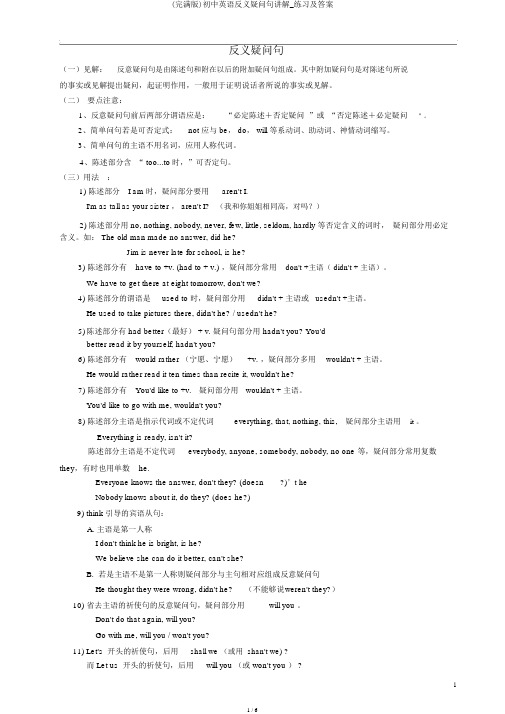
反义疑问句(一)见解:反意疑问句是由陈述句和附在以后的附加疑问句组成。
其中附加疑问句是对陈述句所说的事实或见解提出疑问,起证明作用,一般用于证明说话者所说的事实或见解。
(二)要点注意:1、反意疑问句前后两部分谓语应是:“必定陈述+否定疑问”或“否定陈述+必定疑问”。
2、简单问句若是可否定式:not 应与 be, do, will 等系动词、助动词、神情动词缩写。
3、简单问句的主语不用名词,应用人称代词。
4、陈述部分含“ too...to时,”可否定句。
(三)用法:1) 陈述部分I am 时,疑问部分要用aren't I.I'm as tall as your sister , aren't I?(我和你姐姐相同高,对吗?)2) 陈述部分用 no, nothing, nobody, never, few, little, seldom, hardly 等否定含义的词时,疑问部分用必定含义。
如: The old man made no answer, did he?Jim is never late for school, is he?3) 陈述部分有have to +v. (had to + v.) ,疑问部分常用don't +主语( didn't + 主语)。
We have to get there at eight tomorrow, don't we?4) 陈述部分的谓语是used to 时,疑问部分用didn't + 主语或usedn't +主语。
He used to take pictures there, didn't he? / usedn't he?5)陈述部分有 had better(最好) + v. 疑问句部分用 hadn't you? You'dbetter read it by yourself, hadn't you?6) 陈述部分有would rather (宁愿、宁愿)+v. ,疑问部分多用wouldn't + 主语。
中考英语反义疑问句讲解及习题!
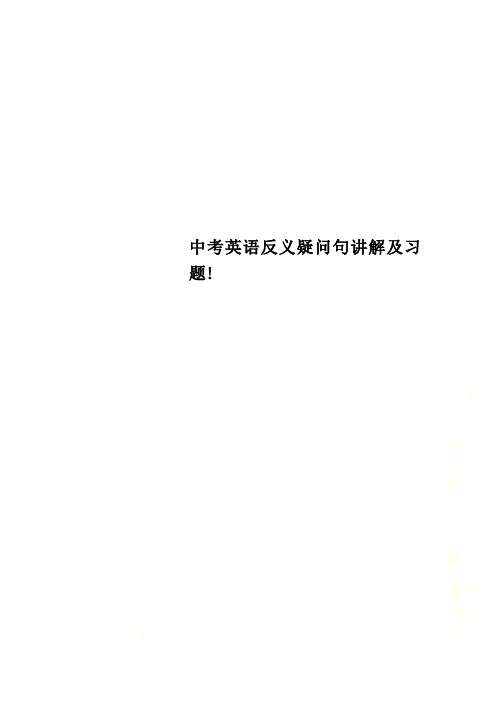
中考英语反义疑问句讲解及习题!如:①Do sit down, won’t you?/ will you?②You feed the bird today, will you?③Please open the window, will you? (won’t you?)(十七)、陈述部分为否定祈使句时,问句部分一般用will you?形式。
如: Don’t make any noise, will you?(十八)、陈述部分为There (Here) + be + 主语时,问句部分用动词+there (here)?形式。
①There are two cakes on the plate, aren’t there?②Here is a story about Mark Twain, isn’t here?(十九)、陈述部分用had better +原形动词表示建议时,问句部分用hadn’t +主语?形式。
①You’d better tell him about the matter, hadn’t you?②We had better do it by ourselves, hadn’t we?(二十)、陈述部分用used to +主语时,问句部分用didn’t + 主语?或usedn’t +主语?形式。
①He used to live in the country, didn’t he?/usedn’t he?②They used to be good friends, didn’t they?/usedn’t they?(二十一)、陈述部分用must (may, might) + have + V-ed表示推测时,若句中带有明显的过去时间的状语,问句部分动词用过去时形式。
如:①He might have forgotten his pen in the classroom yesterday, didn’t he?②You must have got up late this morning, didn’t you? (二十二)、陈述部分用must (may, might) + have + V-ed表示推测时,若句中没有带明显的过去时间的状语,问句部分动词用现在完成时形式。
中考反义疑问句详解及练习和答案

反义疑问句即附加疑问句。
它表示提问人的看法,没有把握,需要对方证实。
它表示提问人的看法,没有把握,需要对方证实。
反义疑问句由两部分组成:前一部分是一个陈述句,后一部分是一个简短的疑问句,两部分的人称时态应保持一致。
1.陈述部分肯定式+疑问部分否定式2.陈述部分否定式+疑问部分肯定式They work hard, don’t they?She was ill yesterday, wasn’t she?You didn’t go, did you?He can’t ride a b ike, can he?请注意以下句型的反义疑问句的用法:1.当陈述部分的主语是I , everyone, everything, nobody 时,后面的疑问句应表示为:I am a student, aren’t IEveryone is in the classroom, aren’t they?Everything begins to grow in spring, doesn’t it?Nobody will go, will they?2. 当陈述部分有never,seldom, hardly,few,little,barely, scarcely, nothing 等否定词时,后面的疑问句则表示为:There are few apples in the basket, are there?He can hardly swim, can he?They seldom come late, do they?3. 当陈述部分是I think 加从句时,疑问句应和从句的人称时态保持一致。
I think chickens can swim, can’t th ey?I think Lucy is a good girl, isn’t she?I didn't think he was happy, was he?4. 陈述部分有had better 时,疑问句应用hadn’t开头:you’d better get up early, hadn’t you?5.当陈述部分是祈使句时,疑问句要根据语气来表达Let’s go out for a walk, shall we?Let us go our for a walk, will you?Turn on the radio, will you?6.反义疑问句的回答用yes,no,但是,当陈述部分是否定形式时,回答要按事实。
初中语法-反义疑问句解析及练习

• —Yes, she has. 不,来过。 • —No, she hasn’t是的,没来过
• 1. ——You won't follow his example, will you?
there? 4.Nothing is in the room, _i_s_ it?
5.The boys and girls have never been to Chongqing, _h_a_v_e__ they?
三. 反意疑问句的陈述部分为 I am… 时, 问句部分习惯上 用 aren’t I?表 示。
• ( )2. His sister have a bad cough, ___B_____ she?
• (A) wasn't (B) doesn't (C) hadn't (D) didn't
• ( )3. John can hardly understand any Chinese, __C_____ he?
to Canada, __A_____?
(A) will she
(B) won't she
(C) isn't she
(D) wasn't she
1. Tom helped me a lot last year, ___d_id_n_’t_ ______h_e_ ?
2.They haven’t been to the Great Wall, __h_a_ve__ __t_h_e_y__ ?
② Nothing has happened to them, has it?
史上最全最有方法的反义疑问句讲解及练习
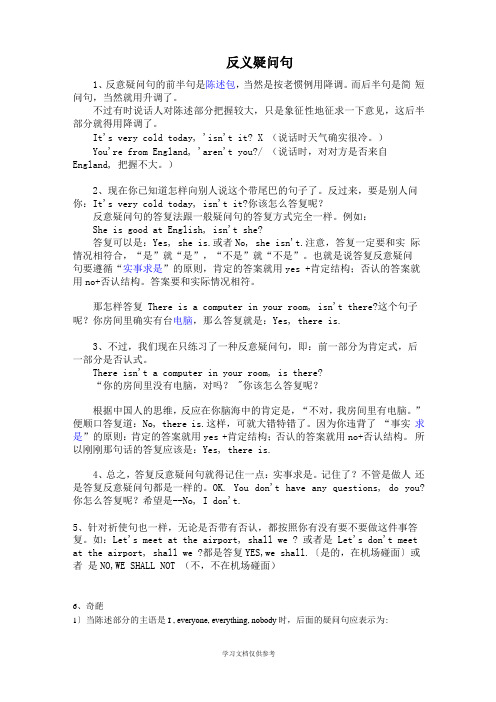
反义疑问句1、反意疑问句的前半句是陈述包,当然是按老惯例用降调。
而后半句是简短问句,当然就用升调了。
不过有时说话人对陈述部分把握较大,只是象征性地征求一下意见,这后半部分就得用降调了。
It's very cold today, 'isn't it? X (说话时天气确实很冷。
)You're from England, 'aren't you?/ (说话时,对对方是否来自England, 把握不大。
)2、现在你已知道怎样向别人说这个带尾巴的句子了。
反过来,要是别人问你:It's very cold today, isn't it?你该怎么答复呢?反意疑问句的答复法跟一般疑问句的答复方式完全一样。
例如:She is good at English, isn't she?答复可以是:Yes, she is.或者No, she isn't.注意,答复一定要和实际情况相符合,“是”就“是”,“不是”就“不是”。
也就是说答复反意疑问句要遵循“实事求是”的原则,肯定的答案就用yes +肯定结构;否认的答案就用no+否认结构。
答案要和实际情况相符。
那怎样答复 There is a computer in your room, isn't there?这个句子呢?你房间里确实有台电脑,那么答复就是:Yes, there is.3、不过,我们现在只练习了一种反意疑问句,即:前一部分为肯定式,后一部分是否认式。
There isn't a computer in your room, is there?“你的房间里没有电脑,对吗? "你该怎么答复呢?根据中国人的思维,反应在你脑海中的肯定是,“不对,我房间里有电脑。
” 便顺口答复道:No, there is.这样,可就大错特错了。
因为你违背了“事实求是”的原则:肯定的答案就用yes +肯定结构;否认的答案就用no+否认结构。
(完整版)初中反义疑问句详解及练习和答案

第 1 页 共6 页 反义疑问句即附加疑问句。
它表示提问人的看法,没有把握,需要对方证实。
需要对方证实。
它表示提问人的看法,没有把握,需要对方证实。
它表示提问人的看法,没有把握,需要对方证实。
反义疑问句由两部分组成:前一部分是一反义疑问句由两部分组成:前一部分是一个陈述句,后一部分是一个简短的疑问句,两部分的人称时态应保持一致。
个陈述句,后一部分是一个简短的疑问句,两部分的人称时态应保持一致。
1.陈述部分肯定式+疑问部分否定式疑问部分否定式 2.陈述部分否定式+疑问部分肯定式疑问部分肯定式 They work hare, don’t they?She was ill yesterday, wasn’t she? You didn’t go, did you? He can’t ride a b ike, can he?请注意以下句型的反义疑问句的用法:请注意以下句型的反义疑问句的用法:1.当陈述部分的主语是I ,而句子又用来征询对方的意见时,附加疑问句中的主语用you 。
如:如:I find English very interesting, don’t you? I don’t like that film, do you?2.当陈述部分的主语是everybody, everyone, someone, nobody, no one, somebody 等合成代词时,附加疑问句中的主语通常用they 。
但亦可用he ,尤其是nobody, no one 等作主语,具有否定概念时。
如:否定概念时。
如:Somebody phoned while I was out, didn’t they? Nobody wants to go there, does he? 3.当陈述部分的主语是不定代词everything, nothing, anything, something 时,附加附加 疑问句中的主语一般用it ,不用they 。
反义疑问句详解及练习题(带答案)

反义疑问句详解及练习题(带答案)反义疑问句的用法1.定义:反义疑问句,表示说话人提出看法、建议或意见,问对方同意与否。
2.结构:有两部分组成,前一部分为陈述形式,后一部分为疑问句。
3.形式:前肯后否与前否后肯。
XXX isn't beautiful, is she?露西不漂亮,是吗?Li Ming is pretty handsome, isn't he?XXX相当帅,不是吗?4.回答:肯定回答:“Yes+肯定结构”,否定回答“No+否定结构”,但是注意“Yes”要译为“不”,“No”要译为“是”。
-Your sister is a XXX, isn't she?你妹妹是老师,不是吗?-Yes, she is.不,她是老师。
-You can play the guitar, can't you?你会弹吉他,不是吗?-No, I can't.是的,我不会。
特别注意:1)当陈述部分为否定式,反意疑问句为肯定式时,其回答往往与汉语不一致"It isn’t cheap, is it?" "Yes, it is."“它不便宜吧?”“不,很便宜。
”"He doesn’t love her, does he?" "No, he doesn’t."“他不爱她,是吗?”“是的,他不爱她。
”此时,"Yes"即不,对前面"It XXX."的否定。
否认反意疑问句的回覆当陈述部分为肯定式,反意疑问句为否定式时,其回答一般不会造成困难,一般只需照情况回答即可:"It’s new, isn’t it?" "Yes, it is."“是新的,对吗?”“对,是新的。
”"He wants to go, doesn’t he?" "No, he doesn’t."“他想去,对吗?”“不,他不想去。
中考反义疑问句详解及练习和答案

反义疑问句即附带疑问句。
它表示发问人的见解,没有掌握 ,需要对方证明。
它表示发问人的见解,没有掌握,需要对方证明。
反义疑问句由两部分构成:前一部分是一个陈说句,后一部分是一个简洁的疑问句,两部分的人称时态应保持一致。
1.xx 部分一定式 +疑问部分否认式2.xx 部分否认式 +疑问部分一定式They work hare, don’ t they?She was ill yesterday, wasn’ t she?You didn ’ t go, did you?He can ’ t ride a bike, can he?请注意以下句型的反义疑问句的用法:1.当陈说部分的主语是 I , everyone, everything, nobody 时,后边的疑问句应表示为: I am a student, aren ’t IEveryone is in the classroom, aren’ t they?Everything begins to grow in spring, doesn’ t it?Nobody will go, will they?2.当陈说部分有 never,seldom, hardly,few,little ,barely, scarcely, nothing 等否认词时,后边的疑问句则表示为:There are few apples in the basket, are there?He can hardly swim, can he?They seldom come late, do they?3.当陈说部分是 I think 加从句时,疑问句应和从句的人称时态保持一致。
I think chickens can swim, can’ t they?I think Lucy is a good girl, isn’ t she?I didn't think he was happy, was he?4.陈说部分有 had better 时,疑问句应用hadn ’t开头:you ’ d better get up early, hadn’ t you?5.当陈说部分是祈使句时,疑问句要依据语气来表达Let ’ s go out for a walk,shall we?Let us go our for a walk, will you?Turn on the radio, will you?6.反义疑问句的回答用 yes, no,可是,当陈说部分能否认形式时,回答要按事实。
(完整版)反意疑问句精讲及专项练习(含答案)

反意疑问句在陈述句之后,附加一个简短问句,对陈述部分所述事实或观点提出疑问,叫反意疑问句。
附加问句的谓语动词及主语的形式均须与陈述部分保持一致,且主语必须用人称代词。
反意疑问句须遵循“前肯后否、前否后肯”的原则。
在中考题中,反意疑问句主要考查不同情况下专项练习:1. Tell me how to solve this problem, ____?A. do youB. don't youC. will youD. shan't you2. Half an hour ought to be enough time, ____?A. shouldn't itB. didn't theyC. oughtn't half an hourD. shouldn't half an hour3. They have to go to school now, ____?A. haven't theyB. don't theyC. hadn't theyD. did they4. When the car crashed, your brother escaped being hurt, ____?A. did itB. didn't itC. didn't heD. did he5. I'm dirty, ____?A. am IB. isn't IC. aren't ID. am not I6. That's the sort of the book you want, ____?A. is thatB. isn't itC. is itD. isn't that7. I suppose you're not leaving, ____?A. are youB. don't youC. do youD. aren't you8. I wish to shake hands with you, ____?A shall I B. may IC. do ID. will I9. AIl these dictionaries are a great help to you, ____?A. aren't all theseB. are all these dictionariesC. aren't theyD. are they dictionaries10. The film that we saw last week was quite amazing, ____?A. was itB. wasn't itC. weren't weD. didn't we11. He has been writing letters all afternoon, but he should have finished them by now, ____?A. shouldn't heB. didn't youC. hasn't heD. has he12. We'd rather stay at home tonight, ____?A. isn't itB. hadn't weC. wouldn't weD. won't we13. There appeared to be no better way, ____?A. didn't thereB. were thereC. did thereD. was there14. You had some trouble finding where I live, ____?A. do IB. hadn't youC. didn't youD. don't I15. He has his hair cut every month, ____?A. has heB. hasn't heC. does heD. doesn't he16. Jim told me that he would take a trip to Britain, ____?A. would heB. wouldn't heC. did heD. didn't he17. Jimmy dare not go to church, ____?A. does heB. dare heC. daren't heD. doesn't he18. She would have worked abroad if she'd had the chance, ____?A. wouldn't sheB. would sheC. hadn't sheD. has she19. Everyone is enjoying themselves, ____?A. aren't theyB. isn't everyoneC. does heD. is he20. Anyone can have a meal here, ____?A. can theyB. can't anyoneC. can't theyD. can anyone21. Your friend needs to come earlier, ____?A. need heB. needn't heC. does heD. doesn't he22. Jenny scarcely comes to visit you, ____?A. does sheB. doesn't sheC. do youD. don't you23. Let's listen to the radio program that the teacher mentioned, ____?A. don't weB. do weC. shall weD. shan't we24. The teacher had a talk with you, ____?A. has youB. hadn't sheC. did sheD. didn't she25. You think you're funny, ____?A. do youB. are youC. don't youD. didn't you26. Janet used to take part in labor in that village, ____?A. used sheB. did sheC. didn't sheD. should she27. What a beautiful flower, ____?A. doesn't itB. isn't itC. won't itD. is it28. No one will believe how difficult his work has been, ____?A. will heB. won't nobodyC. will theyD. won't they29. You must have made the mistake, ____?A. mustn't youB. haven't youC. didn't youD. hadn't you30. Learning how to repair computers takes a long time, ____?A. isn't itB. aren't theyC. doesn't itD. don't they31. Tom has milk with breakfast, ____?A. hasn't TomB. hasn't heC. doesn't TomD. doesn't he32. They must have stayed at hotel last night, ____?A. mustn't theyB. haven't theyC. didn't theyD. hadn't they33. Something'll have to be done about the air pollution, ____?A. won't itB. will itC. has itD. does it34. You must be hungry, ____?A. must youB. mustn't youC. are youD. aren't you35. She had the clothes cleaned, ____?A. had sheB. hadn't sheC. didn't sheD. didn't her daughter36. There isn't anything wrong with the car, ____?A. is thereB. is itC. does itD. does there答案:1-5 CABCC 6-10 BABCB 11-15 ACCBD 16-20 DBAAC 21-25 DACDC 26-30 CBABC 31-36 DCADCA。
(完整版)反义疑问句详细讲解及习题及答案
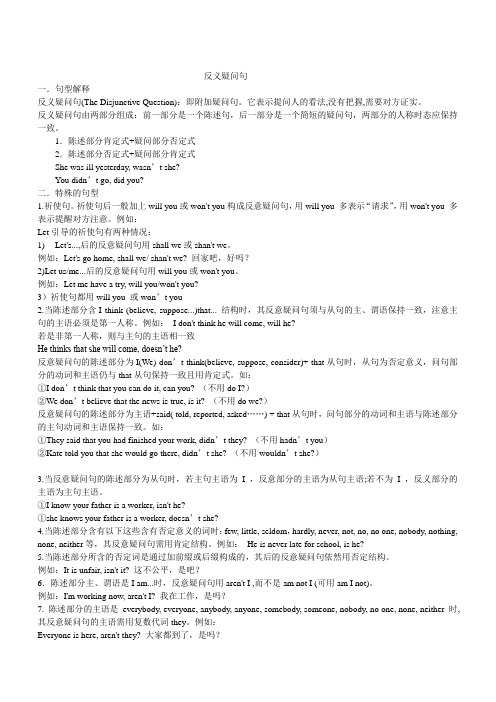
反义疑问句一.句型解释反义疑问句(The Disjunctive Question):即附加疑问句。
它表示提问人的看法,没有把握,需要对方证实。
反义疑问句由两部分组成:前一部分是一个陈述句,后一部分是一个简短的疑问句,两部分的人称时态应保持一致。
1.陈述部分肯定式+疑问部分否定式2.陈述部分否定式+疑问部分肯定式She was ill yesterday, wasn’t she?You didn’t go, did you?二.特殊的句型1.祈使句。
祈使句后一般加上will you或won't you构成反意疑问句,用will you 多表示“请求”,用won't you 多表示提醒对方注意。
例如:Let引导的祈使句有两种情况:1) Let's...,后的反意疑问句用shall we或shan't we。
例如:Let's go home, shall we/ shan't we? 回家吧,好吗?2)Let us/me...后的反意疑问句用will you或won't you。
例如:Let me have a try, will you/won't you?3)祈使句都用will you 或won’t you2.当陈述部分含I think (believe, suppose...)that... 结构时,其反意疑问句须与从句的主、谓语保持一致,注意主句的主语必须是第一人称。
例如:I don't think he will come, will he?若是非第一人称,则与主句的主语相一致He thinks that she will come, doesn’t he?反意疑问句的陈述部分为I(We) don’t think(believe, suppose, consider)+ that从句时,从句为否定意义,问句部分的动词和主语仍与that从句保持一致且用肯定式。
初中反义疑问句详解及练习和答案
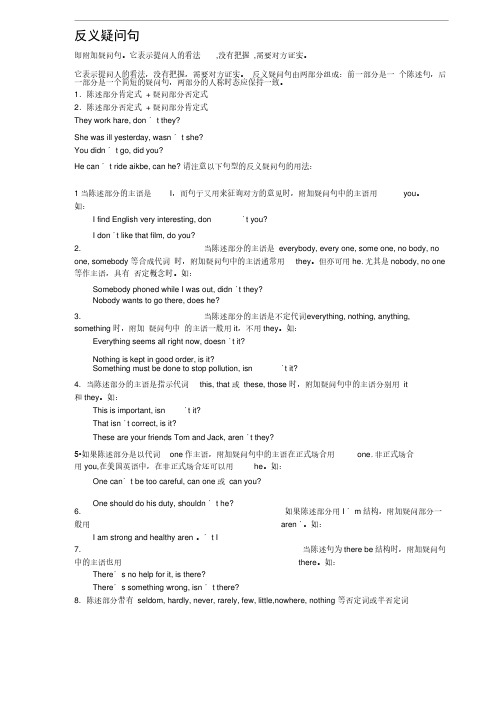
反义疑问句即附加疑问句。
它表示提问人的看法即附加疑问句。
它表示提问人的看法 ,没有把握没有把握 ,需要对方证实。
需要对方证实。
它表示提问人的看法,没有把握,需要对方证实。
它表示提问人的看法,没有把握,需要对方证实。
反义疑问句由两部分组成:前一部分是一反义疑问句由两部分组成:前一部分是一 个陈述句,后一部分是一个简短的疑问句,两部分的人称时态应保持一致。
一部分是一个简短的疑问句,两部分的人称时态应保持一致。
1.陈述部分肯定式.陈述部分肯定式 + 疑问部分否定式疑问部分否定式 2.陈述部分否定式.陈述部分否定式 + 疑问部分肯定式疑问部分肯定式 They work hare, don ' t they? She was ill yesterday, wasn ' t she? You didn ' t go, did you?He can ' t ride aikbe, can he? 请注意以下句型的反义疑问句的用法:请注意以下句型的反义疑问句的用法: 1当陈述部分的主语是当陈述部分的主语是 I ,而句子又用来征询对方的意见时,附加疑问句中的主语用,而句子又用来征询对方的意见时,附加疑问句中的主语用you 。
如:如:I find English very interesting, don 't you?I don 't like that film, do you? 2.当陈述部分的主语是当陈述部分的主语是everybody, every one, some one, no body, no one, somebody 等合成代词等合成代词 时,附加疑问句中的主语通常用时,附加疑问句中的主语通常用 they 。
但亦可用he ,尤其是nobody, no one 等作主语,具有等作主语,具有 否定概念时。
如:否定概念时。
如:Somebody phoned while I was out, didn 't they?Nobody wants to go there, does he? 3.当陈述部分的主语是不定代词当陈述部分的主语是不定代词e verything, nothing, anything, something 时,附加时,附加 疑问句中疑问句中 的主语一般用it ,不用they 。
初中反义疑问句详解及练习和答案

反义疑问句即附加疑问句。
它表示提问人的看法,没有把握,需要对方证实。
它表示提问人的看法,没有把握,需要对方证实。
反义疑问句由两部分组成:前一部分是一个陈述句,后一部分是一个简短的疑问句,两部分的人称时态应保持一致。
1.陈述部分肯定式+疑问部分否定式2.陈述部分否定式+疑问部分肯定式They work hare, don’t they?She was ill yesterday, wasn’t she?You didn’t go, did you?He can’t ride a b ike, can he?请注意以下句型的反义疑问句的用法:1.当陈述部分的主语是I,而句子又用来征询对方的意见时,附加疑问句中的主语用you。
如:I find English very interesting, don’t you?I don’t like that film, do you?2.当陈述部分的主语是everybody, everyone, someone, nobody, no one, somebody等合成代词时,附加疑问句中的主语通常用they。
但亦可用he,尤其是nobody, no one等作主语,具有否定概念时。
如:Somebody phoned while I was out, didn’t they?Nobody wants to go there, does he?3.当陈述部分的主语是不定代词everything, nothing, anything, something时,附加疑问句中的主语一般用it,不用they。
如:Everything seems all right now, doesn’t it?Nothing is kept in good order, is it?Something must be done to stop pollution, isn’t it?4.当陈述部分的主语是指示代词this, that或these, those时,附加疑问句中的主语分别用it和they。
- 1、下载文档前请自行甄别文档内容的完整性,平台不提供额外的编辑、内容补充、找答案等附加服务。
- 2、"仅部分预览"的文档,不可在线预览部分如存在完整性等问题,可反馈申请退款(可完整预览的文档不适用该条件!)。
- 3、如文档侵犯您的权益,请联系客服反馈,我们会尽快为您处理(人工客服工作时间:9:00-18:30)。
反意疑问句反意疑问句是初中英语的重点和难点。
现将有关它的知识总结如下,以便同学们能更好地学习反意疑问句。
对于初中的同学,这是比较完整的资料,请同学们妥善保存。
一、定义反意疑问句是附加疑问句的一种类型。
附加疑问句由陈述句加简短附加疑问句构成,用以要求对方证实所述之事。
附加疑问句有两种类型:一类是非反意的附加疑问句,它的陈述部分要么同是肯定的,要么同是否定的,例如:You call this a day’s work, do you? 你这就叫一天的活儿,是吗?(前后都是肯定)So he won’t pay his bills, won’t he? 这么说他不会付账了,是不是?(前后都是否定)这类附加疑问句带有感情色彩,表示惊奇、愤怒、讽刺、不服气等。
They can help you, can’t they? Th ey can’t help you, can they?You have done your homework, haven’t you?You haven’t done your homework, have you?He went to the aquarium, didn’t he? He didn’t went to the aquarium, did he?注意:1、附加疑问句的构成和一般疑问句的构成相同,如陈述句中有be动词、情态动词或助动词,则使用它们来构成形成附加疑问句;如果没有,则要加上do\does\did。
2、附加疑问句的主语一般是人称代词,there除外。
例如:There is park near our school, isn’t there?必须记住:1、当陈述句的主语是this, that 反意疑问句的主语为it;当陈述句的主语是these, those时,反意疑问句的主语是they。
例如:This is a beautiful picture, isn’t it? Those are my books, aren’t they?2、当陈述句的主语是代表人的anyone, anybody, somebody, everyone, no one等,反意疑问句的主语是they或he。
例如:Everyone knows the answer, don’t they?(强调整体)Someone wants to see you, doesn’t he?(强调个体)3、当陈述句的主语是代表物的something, anything, everything, nothing等,反意疑问句的主语是it。
例如:Everything is all right, is n’t it?4、陈述句的主语是动词不定式,动词的-ing形式或从句时,疑问部分的主语多用it。
例如:Cooking is for moms, isn’t it?What he said is right, isn’t it?二、语调陈述部分读降调,问句部分可升可降。
提问者对陈述部分把握较大时,问句部分读降调;把握不大时,问句读升调。
三、回答方式不管问题的提法如何,若事实是肯定的,就用yes;若事实是否定的,就用no。
You are a student, ar en’t you?Yes, I am. (事实上我是学生)No, I am not.(事实上不是)三、特别注意(绝对的考点)1、“I am +表语结构”,反意疑问句用aren’t I?(口语形式;初中考点)或am I not?(正式)。
如:I am very interested in learning English, aren't I?\am I not?2、陈述部分含有never, few, little, nothing, nobody, no(none, no one, nobody, nothing, nowhere), hardly, seldom,too…to等表示否定意义的词时,问句部分用肯定形式。
例如:There are few people in the room, are there?I have nothing to say, do I?但是,当陈述句中的否定词带有否定前缀(un-, in-, dis-等)或否定后缀(less-等)时整个句子仍视为肯定句,问句部分用否定形式。
例如:They are unhappy, aren’t they?This watch is inexpensive, isn’t it?The medicine is useless, isn’t it?3、祈使句的反意疑问句。
1). Let’s引导的祈使句,问句用shall we?例如:Let’s have a meeting, shall we?2). Let us或Let sb引导的祈使句,问句用will you?例如:Let us watch TV, will you?Let him go with you, will you?3). 其它祈使句,问句用will you?(肯定祈使句也可用w on’t you?但多用will you?否定祈使句则只能用will you?) 例如:Open this book will you?Don’t talk, will you?(只要记住Let’s后用shall we?, 其它用will you?就可以了)4、分清“You’d better; I‘d like; He ‘d rather”中的缩写形式分别代表了had better, would like和would rather, 所以:You’d better go now, hadn’t you?I’d like a cup of tea, wouldn’t I?The y’d rather stay here than go to the zoo, wouldn’t they?5、陈述部分的谓语含有used to 时,疑问部分用didn't +主语。
如:He used to take pictures there, didn't he?6、当need 为实义动词时,疑问部分用助动词do + 主语。
We need to arrive in Shanghai at 7:00, don’t we?当need为情态动词时(当出现need n’t +动词原形时)用need+主语。
例如:We needn’t leave at once, need we?7、带宾语从句的句子如果主句的谓语动词是think, believe, expect, feel, guess等词,且主语是第一人称I或we时,反意疑问部分的人称、时态与宾语从句保持一致,同时还要考虑到否定的转移(否定前移)。
如:I believe that the boy can get a ticket for you, can’t he?I don't think he is smart, is he?We believe she can do it better, can't she?若主句的主语是第二第三人称的话,反义疑问句应该看主句:She thought it is wonderful, didn't she?8、和must有关的反意疑问句1).must表示“必须”,其疑问部分用mustn't(不准,不允许),如:We must follow the rules, mustn’t we?陈述句有mustn’t, 问句用must。
例如:You mustn’t do that again, must you?2). must表示“必要,有必要”时,其疑问部分用needn't(不必),如:You must see the doctor, needn’t you?We must s tay here, needn’t we?3).陈述句中的must表示一种推测,含义为“一定、准是”时,疑问部分必须与must 后面的主要动词相呼应。
通常有四种情况:A. must+动词原形,表示对现在动作或存在情况的推测,问句的动词用一般现在时。
He must be from the south, isn’t he? (一般现在时)B. must +have+过去分词,表示对过去的动作或存在的状态的推测。
如果陈述部分有表示过去的时间状语,问句中的动词就用一般过去时。
She must have heard the good news just now, didn’t she?她刚才肯定听到了这条好消息,不是吗?They must have been at school yesterday, wasn’t they?昨天他们肯定在学校,不是吗?(一般过去时)如果陈述部分没有表示过去的时间状语,这时附加谓语中的动词就用现在完成时。
You must have studied English for ma ny years, haven’t you?你一定学了多年的英语,不是吗?(现在完成时)C. 陈述句部分的谓语动词为现在进行时,也需要时态上的呼应。
I think they must be watching this exciting football match now, aren’t they?想必他们正在观看这场精彩的足球赛。
(现在进行时)9. 在英国英语中,当have/has表示“有,拥有”,反意疑问句有两种形式:He has a sister, hasn’t he?/does he?但是:He doesn’t have a sister, doesn’t he? (当前面有doesn’t等助动词时,不能用has he)当have/has表示其它意思的时候,则不能直接用have/has来构成反意疑问句,而应该使用其它的助动词。
例如:You all have a good time, didn’t you?They had milk and bread for breakfast, didn’t they?She has a cold, doesn’t she?。
